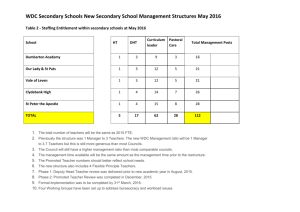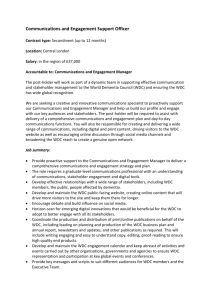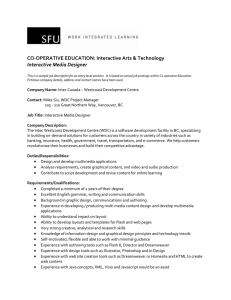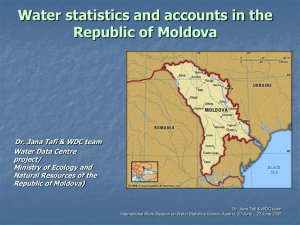Institutional Arrangements and the Water Data Centre
advertisement
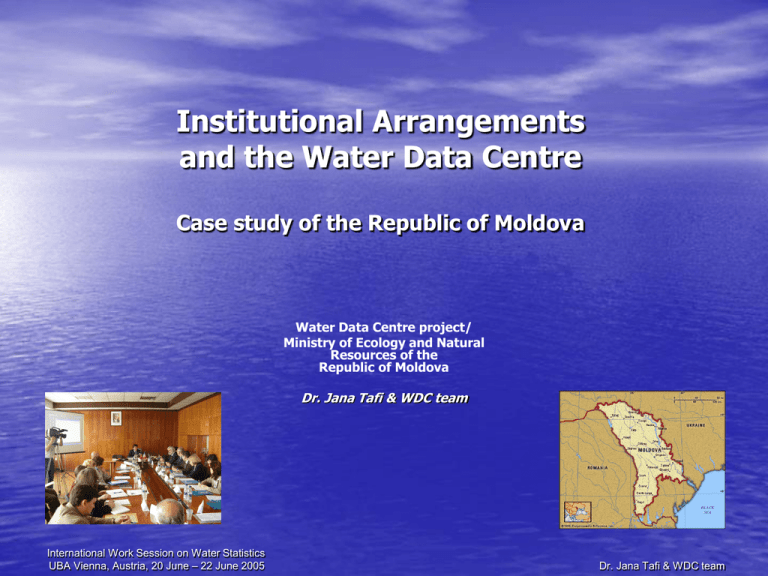
Institutional Arrangements and the Water Data Centre Case study of the Republic of Moldova Water Data Centre project/ Ministry of Ecology and Natural Resources of the Republic of Moldova Dr. Jana Tafi & WDC team International Work Session on Water Statistics UBA Vienna, Austria, 20 June – 22 June 2005 Dr. Jana Tafi & WDC team Background Before water accounting exercise start (1998): • un-coordinated sets of statistics dispersed in different • • • • government institutions; each agency producing data to meet the need of their own users; duplication of data collection (surveys, various studies, inventories, monitoring); inconsitent definitions and classifications; low quality of the data (no surveys on households, lack of coverage of small business, etc ) International Work Session on Water Statistics UBA Vienna, Austria, 20 June – 22 June 2005 Dr. Jana Tafi & WDC team Benefits of water accounts • Demanding tool regarding the consistency of results • • • • • (accounting balance sheet…) : between water resources and their uses by economy, as well as within the hydrological and the users systems... By themselves, the accounts do not correct data; they nevertheless permit to identify gaps and help in bridging them with the help of modelling techniques and expert assessments. Accounts make necessary to assess data sources in order to eliminate error causes Defining ways to reform statistics in order to solve data gaps Providing water indicators derived from water accounts to public, governmental bodies and international organisations (National Strategies on Water access and sanitation, Reducing poverty level, Conventions on water as well as on trans boundaries water courses, etc…) Creation of an inter institutional information network and partnership – the Water Data Centre International Work Session on Water Statistics UBA Vienna, Austria, 20 June – 22 June 2005 Dr. Jana Tafi & WDC team Chalenges & advantages in water accounting The creation of the Water Data Center brings together various sources of information on water: • awareness of lack of consistency among the different • • • • data sets and poor quality of data (the accounting framework is an important tool for checks and balances) working towards common definitions and classifications; identification of data gaps and efforts to improve data coverage (e.g. using various techniques can give some examples; many more analyses can be done with the water accounts (combining different sources of information). better meet users' demand. International Work Session on Water Statistics UBA Vienna, Austria, 20 June – 22 June 2005 Dr. Jana Tafi & WDC team Partners of the WDC Department of Statistics and Sociology (socio-economicdata)data) (Socio-economic MinistryofofHealth Health (drinking water quality data, health/ health/environment environment data, etc;) etc;) MinistryofofEcology Ecology , and Natutal Resources Association Moldageom (underground water waterresource resource) ) Reporting to UNECE, UNDP, OECD, WHO, EEA, EU -WFD … National Water R/Q Indicators WATER DATA CENTRE Cartographic data (Cadastre, rivers , lakes , water supply networks ….), Apele Moldovei (water supply , piping , piping , sewerage.) Hydro -Meteorological Service water quality,river ((water quality , riverdischarge discharge,flux , flux calculations calculations, , rainfall ,rainfall data) data) Own purpose statistics Own purpose statistics International Work Session on Water Statistics UBA Vienna, Austria, 20 June – 22 June 2005 Dr. Jana Tafi & WDC team 0bjective of the WDC • to provide the Ministry of Ecology & other Ministries interested by water issues, national and regional organisations, with the information requested for policy making • reporting to international organisations • informing the public International Work Session on Water Statistics UBA Vienna, Austria, 20 June – 22 June 2005 Dr. Jana Tafi & WDC team The principle of the WDC • shared information system in which partner • • • • organisations put their data in common and access the common database accepts being one of the partner organisations in the Water Data Centre databases supplied by the partners to the WDC remain their property Official agreements data between holders & WDC Use of a common integrated system for managing data: NOPOLU International Work Session on Water Statistics UBA Vienna, Austria, 20 June – 22 June 2005 Dr. Jana Tafi & WDC team NOPOLU System2 by Beture Cerec NOPOLU Diagnostic Example : Pollution hot spots NOPOLU Resource NOPOLU PERUM JASA TIRTA Water Quality BOD BOD Average (mg/l) over Months 07-08-09 since 1990 BRANTAS III Quality Calibration 022 BOD aver age (mg/l) Section by Model NOPOLU2 NOPOLU Wasteloads Aération Atmosphérique NOPOLU Agri International Work Session on Water Statistics UBA Vienna, Austria, 20 June – 22 June 2005 NOPOLU Water quality modelling N ORGANIQUE Dema nde Sédimen taire en Oxyg èn e NH4 OXYGENE DISSOUS Demande Biologique en Oxygène P ORGANIQUE NO3 PO4 ALGUES Dr. Jana Tafi & WDC team Relations entre les divers constituants du modèle Possibilities offered by NOPOLU System • Modern way for water data management • Facilities to update information • ( Queries, Form, Reports, Export to office software) Calculation – Interpolation of gauging values – Quality analyses – River flux to the sea – Quantity and quality account – Integrated Emissions Inventory – Waste load (Domestic, industrial, Agriculture) – Eurowaternet – Agriculture surpluses International Work Session on Water Statistics UBA Vienna, Austria, 20 June – 22 June 2005 Dr. Jana Tafi & WDC team Building WDC • Data collection • • • • Administrative and hydrographic levels Lakes, dams Water supply Waste Water Treatment Plant Population Industrial activities River quality and the flow of the rivers at station of measurements Codification Building of a new system of information unique codes of entities for identification Data type for links between table, software and information Introduction into the tables of NOPOLU structure Building the working data base; relationship between different data base Update the NOPOLU table International Work Session on Water Statistics UBA Vienna, Austria, 20 June – 22 June 2005 Dr. Jana Tafi & WDC team Problems and difficulties & WDC actions • Institutional & internal cooperation( data & database • • • • • exchange) Lack of monitoring data & databases for state, use and pollution of water resource Unreliable data on the state, use and pollution of water (quality of surveys & monitoring) Level of computer & professional skills, use of foreign language by staff Organisation of informatics activities (software & code) Psychological (work together & speak about problems…) International Work Session on Water Statistics UBA Vienna, Austria, 20 June – 22 June 2005 Dr. Jana Tafi & WDC team Institutional & internal cooperation (data & database exchange) + from patches of information on water resources to + + integrated assessment… coordinating activities… streamlining inventories and statistical studies on lakes, dams, waste water treatment plants (inform, check & discuss, avoid duplication ) access to public information jeopardized by attempts of some organizations to sell public data institutional competition for administrating water resources (WDC helps uniting water policy) “Subordination” to different international institutions in reporting International Work Session on Water Statistics UBA Vienna, Austria, 20 June – 22 June 2005 Dr. Jana Tafi & WDC team Unreliable data & WDC action (“FAO report review of world water resources by countries”, 2003) Case: • Quality of surveys when compulsory for water users • Monitoring stations QA/QC • Technical status • Frequency of samples • Representativeness of placement • Recognition of existence of data quality problems • Responsibility for data reporting International Work Session on Water Statistics UBA Vienna, Austria, 20 June – 22 June 2005 Solution: • Combine data selective survey + sampling +modeling • Standardize water definitions • Unique codification • Use of WDC/ NOPOLU type integrated applications • Water accounts Dr. Jana Tafi & WDC team Agriculture pressure to water resources: unreliability of data on water usage small producers: more than 70% of the total agriculture production. Agriculture: crops & irrigation water, Moldova, 1995-2002 120 100 procent 80 Crops/small farms 60 Crop/big farms Water used for irrigation 40 20 0 1994 1995 1996 1997 1998 1999 2000 2001 2002 2003 year Agriculture: livestocks & water, Moldova, 1995-2002 120 100 80 % livestock/small farms 60 livestock/big farms water used for cattle 40 20 0 1995 1996 1997 1998 1999 2000 2001 2002 year International Work Session on Water Statistics UBA Vienna, Austria, 20 June – 22 June 2005 Dr. Jana Tafi & WDC team Inconsistency in data: various sources of information & approach to methodology Gap of data on water use in animal husbandary, Moldova, 1996-2003 90 80 70 60 50 40 30 20 10 0 01 20 02 20 03 20 m il m 3 W at er A cc o "A M unt pe od s le el M lin ol g do ve i" 96 19 997 8 1 9 19 999 1 00 Year 20 Irrigation: surface & water use, Moldova, 1995=100 Surface iirigated % Water used for irigation 1995 1996 1997 1998 1999 2000 2001 2002 Year International Work Session on Water Statistics UBA Vienna, Austria, 20 June – 22 June 2005 Dr. Jana Tafi & WDC team Information gap: the National Report of Apele Moldovei, DSS & the Water Account Gap in data on water supply, Moldova, 1995-2002 100 90 80 70 60 % DSS 50 Apele Moldovei 40 30 Water Company 20 WA 10 0 1995 1996 1997 1998 1999 2000 2001 2002 Year International Work Session on Water Statistics UBA Vienna, Austria, 20 June – 22 June 2005 Dr. Jana Tafi & WDC team Information gap: National Report of Apele Moldovei & Water Account : Households water consumption, Moldova, 2000 reporting data & data water account absence data on households non-connected to water supply system ( 76% of households) Households water consumption, Moldova, 2000 reporting data & data water account 250000 Report Water Account International Work Session on Water Statistics UBA Vienna, Austria, 20 June – 22 June 2005 village city village Report city Noncanalized water-total village city Canalized water-total village city Re Wa Abstracted water-total Supplied water-total 0 Report village 50000 Noncanalized water-total city 100000 village city Canalized water-total village city 150000 Abstracted water-total village city 200000 Dr. Jana Tafi & WDC team WDC needs organizing training in computer and professional skills • one third need special training in environment statistics, • • • • in particular methodologies linked to water statistics: data collection, sampling & modeling, indicators and indexes; one third mentioned their working places are not arranged with computers; majority indicated software packages such as MapInfo and Access as unknown or unused; One quarter knew about the existing database on water & they had no access & no possibility to use in reporting; 10% indicated did not know how to operate databases. International Work Session on Water Statistics UBA Vienna, Austria, 20 June – 22 June 2005 Dr. Jana Tafi & WDC team Training results: monitoring data +cartografic - gauging stations & rainfall trends, quality stations, industry pressure Ministry of Ecology, Constructions and Territorial Development Ministry of Ecology, Constructions and Territorial Development WATER DATA CENTRE IN MOLDOVA WATER DATA CENTRE IN MOLDOVA RAINFALL for 1999 per station 33664 GAUGING STATIONS 33678 33744 33748 33754 81282 33815 RAINFALL for 1999 140 0 50 100 kilometers 33829 jav feb mar apr may june july aug sept oct nov dec 33883 33885 Suported by: IFEN and BETURE-CEREC Suported by: IFEN and BETURE-CEREC International Work Session on Water Statistics UBA Vienna, Austria, 20 June – 22 June 2005 Dr. Jana Tafi & WDC team Policy makers validation & mass media International Work Session on Water Statistics UBA Vienna, Austria, 20 June – 22 June 2005 Dr. Jana Tafi & WDC team WDC & communication means International Work Session on Water Statistics UBA Vienna, Austria, 20 June – 22 June 2005 Dr. Jana Tafi & WDC team A quick example that it is important to produce and to publish reliable data can be found from the website http://www.gapminder.org/: “in Moldova 92% population have access to safe drink water”. International Work Session on Water Statistics UBA Vienna, Austria, 20 June – 22 June 2005 Dr. Jana Tafi & WDC team According to the last statement of the Ministry of Health in Moldova, 44% of population or 1,8 million people have no access to safe drinking water (22 March 2005). Cross-checking and integrating data and statistics in Water Accounts should help in avoiding wrong assessments and sending wrong messages to the government, international organizations and the public International Work Session on Water Statistics UBA Vienna, Austria, 20 June – 22 June 2005 Dr. Jana Tafi & WDC team
